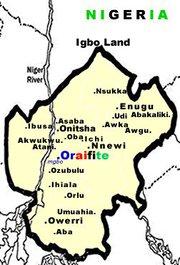Confab okays 18 new states

By IHEANACHO NWOSU and FRED ITUA, Abuja
• Delegates jubilate over South-East victory
There was jubilation yesterday when the National Conference overwhelminghly endorsed the recommendation for additional states for the South-East. The delegates also approved the creation of 17 new states nation-wide. The zone presently has five states.
The National Judicial Institute (NJI) venue of the conference erupted in celebration. Soon after they voted in favour of the recommendation of the Committee on Political Restructuring and Forms of Government, delegates left their seats and exchanged pleasantries.
For once, delegates from the other five geo-political zones joined their South-East counterparts in celebrating what many described as a landmark victory for the Igbos. Many delegates repeatedly exclaimed: “History has been made. Today, justice has been served. We have won. It’s a new day for us.”
The overwhelming approval for the additional creation came after weeks of intense lobbying and underground politicking by Igbo delegates. The landmark approval did not come without a lone opposition from a northern delegate, Dr Auwalu Yadudu from Kano State. His attempts to call the attention of the leadership to his ‘Point of Order’ was ignored.
For over 10 minutes, he shouted. Apparently sensing that his pleas had been ignored, he quietly sat down.
The conference has also recommended the creation of 17 additional states, but with stringent conditions attached. It approved that the 18 states sought to be created must be viable and have at least one natural mineral or solid resources.
Some of the states recommended include Adada, Aba, Savannah, Njaba-Anim, Gurara, Ogoja, Etiti, Anioma, New Oyo, Ijebu and Orashi.
The delegates also approved rotational presidency between North and South. This is equally coming after weeks of serious lobbying by delegates with vested interests. If the adopted recommendation eventually becomes law, the zoning arrangement which is already in existence in some political parties in the country will become legally operational.
By the arrangement, the position of the president will now rotate between North and South. There is, however, a proviso that within each region, the position shall rotate among the geo-political zones.
For instance, if a South-South president is elected, upon its return to the South, South-West or South-East will produce the next president. Delegates believe the new arrangement will address the current injustice being experienced by certain sections of the country.
The conference also voted for the reversal to the old National Anthem, insisting that it captures the feelings, yearnings and aspirations of every Nigerian.
Meanwhile, the delegates renewed their bickering over plans to remove local government as one of the federating units. Southern delegates have repeatedly complained about the imbalance in the number of council areas in their region, contrary to what is obtained in the North.
Northern delegates, however, wanted the status quo be maintained. They argued that the councils should be recognised as a third tier of government and should also get direct funding from the Federation Account.
The conference committee report had recommended that the issue of local government administration should be transferred to the states.
It also recommended that states should be allowed to create the number of local governments they can afford. By the recommendation, the local government will cease to be recognised as a third tier of government and will also cease to get funding from the Federation Account.
When the issue came up for voting yesterday, delegates voted in favour of its scrapping. The conferees also voted for non-recognition of caretaker committees in local governments even as they recommended that such councils should not be funded by the government.
Similarly, delegates defeated moves to peg the number of members of the Federal Executive Council (FEC) at 18, with specific numbers chosen from each geo-political zone.
The recommendation of the committee had also sought to empower the President to have the choice of choosing FEC members from the parliament. Delegates overwhelmingly voted against the move.
Many delegates, who were obviously dissatisfied with the adoption of some of the recommendations, almost resorted to fisticuffs. After their fruitless attempts to get the attention of the leadership of the house, they resorted to insults and came close to fighting until they were separated by fellow delegates.
Total autonomy for state Houses of Assembly was also sanctioned by the conference yesterday. The recommendation was overwhelmingly approved.
Source: Sun
